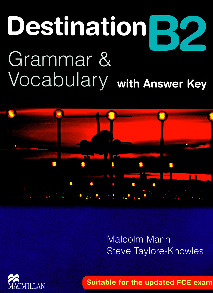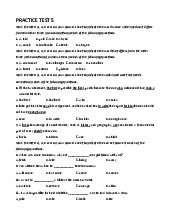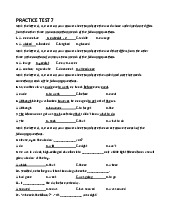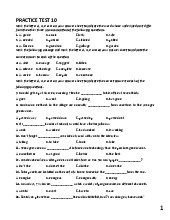










Preview text:
lOMoAR cPSD| 36844358 CITY LIFE (UNIT 2)
A. NEW WORDS, STRUCTURES AND GRAMMAR I. New words I.
Choose the options whose underlined part is pronounced differently from the rest. 1. A. conduct D. fun lOMoAR cPSD| 36844358 2. A. metropolitan B. polluted C. forbidden D. affordable 3. A. fabulous B. packed C. asset D. canal 4. A. metro B. ocean C. cosmopolitan D. local 5. A. delicious B. facility C. city D. place
II. Choose the best answer
1. Osaka has become one of the...........................“livable” cities in Asia. A. more B. better C. much D. most
2. London is one of the largest cities in the world but its populations is a lot..........................than Tokyo. A. small B. few C. smaller D. fewer
3. London is probably most famous for its museums, galleries, palaces, and other sights, but it also
includes a....................range of peoples, cultures and religions than many other places. A. greater B. big C. wide D. wider
4. Ha Noi city now is..........................than it was 10 years ago. A. as large B. more large C. much larger D. the largest
5. This river now is much less..........................than before. People are aware of the environment and
they try to keep the river clean. A. polluted B. pollutes C. polluting D. pollution
6. When we were in Da Nang, we spent a lot of time......................around and looking at the ancient temples, bridges and houses. A. wander B. wandering C. wandered D. wanders
7. On children festival, the zoo is always............................with people, mainly children. A. packed B. had C. contained D. scored
8. You should take your shoes...........................when you go into the temples. A. up B. in C. off D. on
9. When the doctor came in, he went.............................all my test results and gave me a prescription. A. out B. over C. in D. of
10. A close friendship has gradually grown..............................between them. They help each other in their daily life. A. in B. out C. of D. up
11. It is considered that life in a city is wonderful and ……………… A. funny B. boring C. enjoyable D. helpful
12. You’ll have...............................opportunities to widen your global horizons while livi ng in this cultural capital city. A. unlimited B. comfortable C. cheerful D. populous lOMoAR cPSD| 36844358
13. Dubai’s Palm Islands in the blue ocean is the........................of a good and sunny life. A. indicator B. view C. signal D. sign
14. This place is so ………………. with the non-stop flow of customers to come and enjoy Pho. A. delicious B. convenient C. popular D. exciting
15. Visitors can take a free boat from Manhattan to Staten Island for a great.............................of the
Statue of Liberty and the Manhattan skyline. A. view B. sight C. scene D. landscape
16. Ha Noi also offers a nightlife as exciting as............................in Ho Chi Minh City. A. itt B. which C. what D. that
17. When you want to relax, you’ll have one of the world’s.........................cities at your feet, with
more than 40% green space and open water to enjoy. A. greener B. greenest C. mostly green D. green mostly
18. Let me know when you come to Ha Noi and I’ll ……………….. A. take you out
B. bring you around C. cheer you up D. show you round
19. We expected her at nine but she finally..........................at eleven. A. turned up B. turned out C. came over D. grew up
20. Ann is taking extra lessons to...........................what she missed while she was sick. A. take back B. get on well with C. keep up with D. look forward to
21. The architects got inspired to use the lotus flower in the design for the …………. A. city B. skyline C. skyscraper D. downtown
22. Villagers are more kind, friendly, and warm-hearted than city ……………. A. dwellers B. foreigners C. beginners D. movers
23. You can see the..........................of the suburbs in Ho Chi Minh City with many apartment
buildings, supermarkets, shopping centres, and schools. A. urban area B. convenience C. urban sprawl D. living condition
24. Dong Khoi street is the main shopping street in the...........................of downtown in Ho Chi Minh City. A. mind B. heart C. head D. spot
25. Opened in 1937, the Golden Gate Bridge in San Francisco still ranks among the top 10
…………… bridge spans in the world. A. long B. longer C. mostly long D. longest
26. No city in America has..........................monuments and museums into one area as Washington D.C. A. as much B. such many C. as many D. a few
27. The new student was very shy at the beginning, but then he.......................Well with everyone. A. got on B. went on C. got over D. cheered up
28. The polices never.....................all hope of finding the lost child. A. stops B. think over C. grow up D. give up
29. He’ll be very upset (buồn) if his employer ..........his offer. lOMoAR cPSD| 36844358 A. pulls down B. finds out C. turns off D. turns down
30. It’s time to say goodbye, but I’m.......................meeting you all again soon.
A. looking forward to +V_ing B. getting on with C. keep up with D. put up with III. Put the
words in brackets into the right forms to complete the sentence.
1. I am going to visit Da Nang so can you tell me what the greatest.............................in Da Nangare? (ATTRACT)
2. Don’t worry about your travelling because the public transport here is convenient and ……………….. (RELY)
3. Sydney is a metropolitan and..............................city so you have a great variety of things andfoods
from different countries. (MULTICULTURE)
4. My aunt lives in one of the most........................parts in Paris. She is a well-known fashiondesigner there. (FASHION)
5. The outdoor food markets in Singapore are fun and...........................so when you go there
youshould try some food there. (AFFORD)
IV. Choose the best option A, B, C, or D to fill in each blank.
Brighton is a city (1) ………………. the south of England. It’s got a population of (2)
…………….. 160,000 and its location has (3) it a popular destination for tourists.
Brighton is 85km from London. It’s about an hour on the train. It (4) ……………… over 8.5 million
visitors annually and is the most popular seaside destination in the UK for overseas tourists.
I like Brighton because it’s a (5) place and it’s very pretty. There are some really old buildings and
it’s got some nice parks. For tourists, there are a (6)…………………..interesting shopping
areas, good restaurants, large cultural, music and arts scene. Brighton ishome (7)
………………… many indedpenent record labels such as FatCat Records and Memorials of
Distinction. Brighton (8) ………………. several railway stations, many bus routes, coach services
and taxis. In spring and summer, thousands of students from all over Europe gather (9)
………… language courses at many language schools here.
Every time I come here, my favourite places are the beach and the aquarium. For me, Brighton is one
of (10) ………… beautiful cities in the world. 1. A. in B. on C. of D. up 2. A. which B. about C. approximate D. near 3. A. turned B. started C. made D. converted
4. A. takes B. calls C. invites D. attracts 5. A. interested B. friendly C. friend D. beautifully 6. A. many B. lots of C. lot of D. much 7. A. to B. of C. in D. on 8. A. has B. is C. makes D. carries lOMoAR cPSD| 36844358 9. A. attend B. to attend C. attending D. attended 10. A. best B. most C. more D. the most V.
Choose the best option to fill in each blank in the following passage.
Unlike life in the countryside which is often considered to be simple and traditional, life in the city
is modern and complicated. People, from different regions, move to the cities in the hope of having
a better life for them and their children. The inhabitants in city work as secretaries, businessmen,
teachers, government workers, factory workers and even street vendors or construction workers.
The high cost of living requires city dwellers, especially someone with low income, to work harder
or to take a part-time job. For many people, an ordinary day starts as usual by getting up in the early
morning to do exercise in public parks, preparing for a full day of working and studying, then
travelling along crowded boulevards or narrow streets filled with motor scooters and returning home
after a busy day. They usually live in large houses, or high-rise apartment blocks or even in a small
rental room equipped with modern facilities, like the Internet, telephone, television, and so on.
Industrialization and modernization as well as global integration have big impact on lifestyle in the
cities. The most noticeable impact is the Western style of clothes. The “ao dai” – Vietnamese
traditional clothes are no longer regularly worn in Vietnamese women’s daily life. Instead, jeans,
T-shirts and fashionable clothes are widely preferred.
1. The most important reason why people move to the city is that…………….
A. to look for a complicate life B. to take part-time jobs C. to have busy days D. to look for a better life
2. According to the passage, the city life can offer city dwellers all of the following things EXCEPT ……….. A. the Internet
B. friendly communication with neighbors
C. a variety of jobs in different fields D. modern facilities
3. We can infer from the passage that ……………. A. there is
a big gap between the rich and the poor in the city.
B. people do morning exercise in public parks because they have much free time
C. people leave the countryside because life there is simple.
D. most of the urban dwellers have low income.
4. Industrialization and modernization may lead to ……………. A.
the fact that women no longer wear ao dai.
B. the disappearance of Western-styled clothes.
C. some changes in lifestyles. D. global integration.
5. The word impact in paragraph 2 is closet in meaning to …………… A. force B. action C. situation D. effect VI.
Complete each sentence so it means the same as the sentence above. 1.
Many people think there is no city in Viet Nam that is cleaner than Da Nang city. lOMoAR cPSD| 36844358 Many people think
................................................................................................................................................................... 2.
I found the trip to the craft village quite interesting. I felt quite
............................................................................................................................................................................. ...... 3.
My father says the place in which we are living is the noisiest one in Ha Noi. My father says that
no............................................................................................................................................................... 4.
He hasn't changed much since I last met him in 2000. He is the
same..................................................................................................................................................................... ....... 5.
I have never eaten a more delicious food than this one. This food
............................................................................................................................................................................. ....... lOMoAR cPSD| 36844358 VII.
Fill in each blank with a suitable word from the box
Multicultural- đa Problems- những Cities thành phố Affordable phải Wandering đi văn hóa
6 vấn đề 9 7 chăng 5 lang thang 4 Attractions sự Vehicles xe cộ
Convenient tiênj Destination điểm Drawbacks tiêu thua hút 10 2 lợi 1 đến thu hút 3 cực 8
1. Nowadays, many students who have just left the universities try to stay in big cities becausethey
can easily find their jobs and live a..............................life there.
2. During the rush hours, some parts of Ha Noi and Ho Chi Minh city are often packed withpeople and ………………..
3. If you have an opportunity to go to Sydney, you should visit both natural and
manmade..........................such as Sydney Harbour, the Royal National Park, Bondi Beach as well
as Royal Botanical Gardens, Sydney Opera and the Harbor Bridge.
4. When I visited Hoi An last year, I spent most of my time..............................around andlooking at
the ancient temples, houses, and bridges.
5. When you visit Ha Noi, try some street food there because it is really delicious and ………………..
6. Singapore is a.......................................country. It includes Malay, Chinese, Indians, Europeanand Vietnamese.
7. Every year, the Economist Intelligent Unit conducts a fascinating survey to
determinewhich.......................around the world “provide the best living conditions”.
8. I think living in a city has a number of..............................., such as traffic jams, trafficaccidents,
noise pollution, visual pollution and water pollution.
9. People say that air pollution together with littering is causing many......................in our citynow. 10.
London is one of the largest cities in the world. Its population is a lot smaller than Tokyo but
it is by far the most popular tourist ………
UNIT 3: TEEN STRESS AND PRESSURE
I: NGỮ PHÁP: CÂU GIÁN TIẾP lOMoAR cPSD| 36844358 1: Khái niệm
Ví dụ câu trực tiếp:
He said “I bought a new motorbike for myself yesterday”.
- Trong câu gián tiếp, thông tin đi từ người thứ nhất qua người thứ hai đến người thứ ba. Khi đó câu
có biến đổi về mặt ngữ pháp.
Ví dụ câu gián tiếp: He said he had bought a new motorbike for himself the day before.
2. Quy tắc chuyển từ trực tiếp sang gián tiếp
2.1. Quy tắc chuyển từ lối nói trực tiếp sang gián tiếp: lùi một thì
• Simple present –> simple past
• Present progressive –> past progressive
• Present perfect –> past perfect
• Simple past –> past perfect
• Past progressive –> past perfect progressive
• Simple future –> would + V Can/may/must –> could /might/had to
2.2. Các chuyển đổi khác: – Đại từ nhân xưng: • I –> he/she • We –> they • You –> I/ we
(tân ngữ và tính từ sở hữu chuyển theo đại từ nhân xưng)
– Trạng từ chỉ nơi chốn: • Here –> there • This –> that • These –> those
– Trạng ngữ chỉ thời gian: • Today –> that day
• Tomorrow –> the next day/ the following day
• Yesterday –> the day before/ the previous day
• Last week –> the week before/ the previous week
• The day after tomorrow –> in 2 days’ time
• The day before yesterday –> two days before. • Now –> then • Ago –> before
2.3. Các trường hợp không đổi thời
– Sự thật, sự việc luôn luôn đúng:
“The earth moves round the sun” he said. lOMoAR cPSD| 36844358
–> He said that the earth moves round the sun.
– Câu điều kiện loại II và III:
“If I were you, I would leave here” he said. –> He said that if he were me, he would leave there.
– Wish + past simple/ past perfect:
“I wish I lived in Da Nang”, he said. –> He said he wished he lived in Da Nang.
– Cấu trúc “it’s time somebody did something”:
“It’s time he woke up”, she said. –> She said it was time he woke up.
– Would/ should/ ought to/ had better/ used to không chuyển:
“ You’d better work hard” he said –> He said that I had better work hard.
2.4. Các cách chuyển đổi cơ bản
A. Say that + a statement –> agree (đồng ý), refuse (từ chối), offer (đề nghị), promise (hứa),
Threaten (đe dọa) + To V
“All right, I’ll help you” he said. –> He agreed.
“ Oh, no, I won’t come to your party”, he said. –> He refused.
“I’ll look for the cat for you tomorrow if you like” he said. –> He offered
“I’ll visit your parents when I arrive there”, he said –> He promised
“I’ll sell the TV set if you keep on watching it all day”, said the father –> The father threatened
B: Say that + a statement –> accuse sb of (buộc tội), admit (thừa nhận), apologise for (xin lỗi),
deny (từ chối), insist on + V-ing (khăng khăng)
- “You stole the jewels” said the inspector –> The inspector accused
- “I’ve made the wall dirty” said one student. –> One student admitted
- “I’m sorry I’m late” she said. –> She apologized
- “No, we didn’t enter the garden” said the boy. –> The boy denied
- “Certainly, I’ll buy that car for you”, said he. –> He insisted
C. Say to somebody + a statement –> told somebody + that + clause
“I’ve finished all my homework”, he said to me. –> He told
D. Say + a statement –> said that + clause
“I’m going to Hanoi tomorrow”, he said. –> He said that lOMoAR cPSD| 36844358
E. Statement with command, request, advice, invitation, offer –> advise, ask, beg, encourage,
invite, order, tell, warn, remind… + Tân ngữ + (not – câu phủ định) To V
“You’d better hurry”, he said. –> He advised
“Post the letter for me, will you?”he said. –> He asked
“Make another try, please”, he said –> He encouraged
“Don’t drive too fast”, he said. –> He warned
“Remember to close the door”, he said. –> He reminded me to
“Don’t forget to come at 6 a.m tomorrow”, he said. –> He reminded to come at 6 a.m the next day.
F. Questions in indirect speech – Câu hỏi
– Thì, đại từ, tính từ sở hữu, trạng từ chuyển như ở câu tường thuật.
– Yes-no questions –> asked/wanted to know if/whether“Are you absent from your classes today?” he asked.
–> He asked/wanted to know if I was absent from my classes that day.
– Wh-questions –> asked/wanted to know + question word + clause.
“Where do you often meet your friends?” she said.
–> She asked where I often met my friends.
G. Questions with “shall I…”–> 4 loại sau:
• About future event (sự kiện trong tương lai)
“Shall we attend the meeting tomorrow”, she said. –>She asked if they would attend the meeting the next day
• Request for instruction or advice (Lời hướng dẫn hoặc lời khuyên)
“Shall I read it, mother?” ha said. –> He asked his mother if he should read it. • Offer to do something
“Shall we bring you some new books?” she said. –> She offered to bring me some new books. • Suggest to do something
“Shall we go to the cinema tonight”, he said. –> He suggested going to the cinema that night.
H. Questions with “Will you, would you, could you…?” (yêu cầu, đề nghị, mời)–> offer, invite, order, ask, told.
“ Will you come to my party tomorrow?” he said. –> He invited me to come to his party the next day.
“Could you get ready at 6p.m tonight?” he said. –> He told/asked me to get ready at 6p.m that night.
“Would you like some cigarettes?” he said. –> He offered me some cigarettes.
“Will you shut your mouth?” he said. –> He ordered me to shut my mouth. lOMoAR cPSD| 36844358
I. Let’s do…–> suggest + V-ing (nếu bao gồm cả người nói thực hiện hành động)
Let’s do…–> suggest + that S should do…(có thể bao gồm hoặc không bao gồm người nói
thực hiện hành động)
“Let’s go to the cinema tonight”, he said.
–> He suggested going to the cinema that night. (anh ta cũng đi)
–> He suggested that they should go to the cinema that night
J. Yes, let’s do…–> agree
No, let’s not do… –> be against the idea.
“Let’s eat out tonight” said the mother.
“Yes, let’s” said the son.
“No, let’s not” said the father.
–> The mother suggested eating out that night and the son agreed but the father was against the idea. K. Must –> had to
“I must finish my work tomorrow”, he said. –> He said that he had to finish his work the next day.
“Must you go soon?” she said. –> He asked if I had to go soon.
L. Câu cảm thán trong lời nói gián tiếp
• What + a + noun! /how + adj –> said that + clause
–> gave an exclamation of delight (vui mừng, tán thưởng), disgust (kinh tởm), honor (sợ), surprise (ngạc nhiên)
“How beautiful the picture is”, he said.
–> He said that the picture was beautiful.
–> He gave an exclamation of delight.
“What a dirty kitchen!” she said.
–> She said that the kitchen was dirty.
–> She gave an exclamation of disgust. “How wonderful”, he said.
–> He said that it was wonderful.
–> He gave an exclamation of surprise.
• “Yes/no” –> subject + trợ động từ
“Have you finished your homework?” he said “Yes”, she said
–> He asked her if she had finished her homework and she said she had.
“Are you ready for the exam?” he said. “No”, she said.
–> He asked if she was ready for the exam and she said she wasn’t. lOMoAR cPSD| 36844358
M. “Thank”–> subject + thanked
“Would you like to have dinner with me tonight?”, he said. “thank you, I’d love to” she said.
–> He invited her to have dinner with him that night. She thanked him and said she would love to.
“Good luck”, he said –> he wished me luck.
“Congratulation!”, he said –> he congratulated me. 2: Bài tập
1 "Have you travelled abroad much?" he asked me.
.....................................................................................................................................
2 "Who has written this note?" the boss asked the secretary.
.......................................................................................................................................
3 "I've just received a postcard from my sister," my friend said to me.
...........................................................................................................................................
4 "The students also took part in arranging the conference," the chair¬man said.
............................................................................................................................................
5 "Have you been here long?" the stranger asked me.
.............................................................................................................................................
6 "Did you really see this happen with your own eyes?" the policeman asked the boy.
...........................................................................................................................................
7 "I hope they will have taken a decision by the end of the meeting," she remarked.
..........................................................................................................................................
8 "Did you watch the detective film on TV yesterday?" he asked her.
.............................................................................................................................................
9 "This story happened long ago," he said, "and few people remember anything about it."
........................................................................................................................................
10 "I haven't read so interesting a book since I don't remember when," she said.
.........................................................................................................................................





